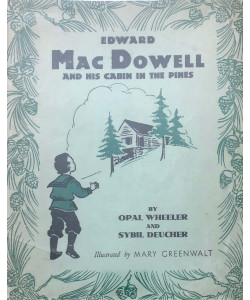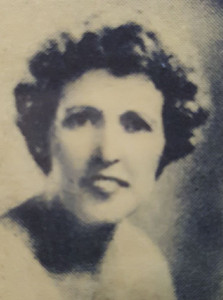Edward MacDowell and His Cabin in the Pines

Author:
Sybil Deucher, Opal Wheeler ![]()
![]() Complete Authored Works
Complete Authored Works
Illustrator:
Mary Greenwalt
Publication:
1940 by E. P. Dutton & Co., Inc.
Genre:
Biography, Music, Non-fiction, Performing Arts
Series:
Opal Wheeler Music Biographies
Pages:
144
Current state:
Basic information has been added for this book.
It has been read but content considerations may not be complete.
Book Guide
Search for this book used on:
At last he walked slowly to the piano and everyone leaned forward to look at the tall, handsome figure with black hair and serious eyes. When all was quiet, Edward began to play. Strong, ringing chords came from the piano and sounded to the far corners of the hall like a great orchestra. Then came light, swiftly running passages that grew louder and louder until the music swept over the keys with such power that the people sat up, spellbound. Here was a great artist, indeed! There was a storm of applause when he had finished playing and MacDowell was called to the stage again and again until he sat to play his own compositions. When the pieces were finished, there were cries of "Bravo! MacDowell! MacDowell!"
And here is his story, told by the distinguished author-musicians who gave us "Mozart the Wonder Boy," "Haydn, the Merry Little Peasant," "Bach, the Boy from Thurgina," and "Franz Schubert and His Merry Friends,"—a sensitive, appealing and lively biography of America's beloved composer which boys and girls (all others, too) will take to their hearts and treasure.
"Here we come, Whitey," called the four-year-old, blue-eyed Edward, to the faithful old horse, waiting in front of the red-brick house on Clinton Street, to take the MacDowell family away to Grandfather's farm. And gay little tunes he sang along the way.
Although Edward's Mother encouraged her young son's light-hearted improvising, Grandfather was and ardent Quaker, who admonished him gently: "Thee must think of other things besides music, Grandson." . . . "But I like to sing, Grandfather." . . . "Singing is not for thee, little one. It will bring thee no good." And Grandmother MacDowell ended the discussion with a platter of fat juicy sausages and rich warm milk . . .
But if young Edward loved music, nature, bright colors, his parents were dreamers too: his Father longed to paint, and his brilliant, lively Mother saved for the shiny piano at which Edward would sit for hours, singing lustily and picking out merry tunes—except like every other healthy boy he disliked the hours of practicing scales and exercises. He liked to paint, too, and not until his Mother and the gifted Signor Buitrago, his first teacher, had settled in a tiny flat in Paris where he entered the Paris Conservatory, did the eager and imaginative young Edward cast his lot for music as life's career instead of art.
His Quaker beginnings, his irrepressible interest in music, his youthful triumphs abroad, his visit to the master, Franz Liszt, who greeted him warmly and asked him back again to play at the festival in Zurich—his romance with his pupil, the lovely Marian Nevins, their marriage and return to America, the launching of the Peterboro, New Hampshire, colony which bears his name—these are some of the delightful stories in the rich career of America's greatest composer, told gently, sensitively and with feeling, in a truly inspiring book.
From the book
To view an example page please sign in.
Content Guide
Please sign in to access all of the topics associated with this book and view other books with the same topics.
Please sign in to access the locations this book takes place in and view other books in the same location.
Please sign in to access the time periods this book takes place in and view other books in the same time period.
For information about the lead characters please sign in.
Please sign in to discover interesting content included in the illustrations of this book.
Find This Book
Search for this book used on:





